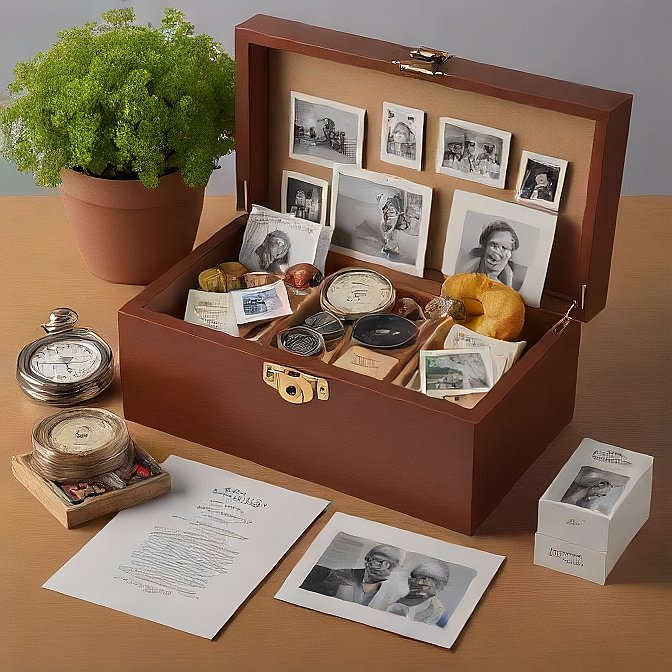Memory Box Ideas for Dementia Patients: A Guide to Creating Meaningful Connections
Creating a memory box for dementia patients is a beautiful way to spark joy, encourage conversations, and preserve precious memories. As dementia progresses, long-term memories often remain more accessible than recent ones. A memory box taps into these cherished recollections, helping individuals feel connected to their identity, family, and life experiences.
In this guide, we’ll explore the best memory box ideas for dementia patients, how to personalize them, and why they are a powerful tool for emotional and cognitive well-being.
What Is a Memory Box for Dementia Patients?
A memory box is a personalized container filled with items that hold emotional significance or evoke happy memories for the individual. These boxes are often used in dementia care to encourage reminiscence, reduce anxiety, and provide a sense of comfort.
Memory boxes can include a wide variety of objects — photographs, trinkets, music CDs, old letters, or anything that reflects the person’s life journey.
Why Are Memory Boxes Important for Dementia Care?
Building a memory box is more than a craft project — it’s a therapeutic tool. Here’s why memory boxes matter:
- Stimulate Memory Recall: Familiar objects trigger long-term memories.
- Encourage Social Interaction: Sharing the box with family or caregivers opens conversations.
- Provide Comfort: Loved and familiar items reduce confusion and anxiety.
- Boost Emotional Well-being: Remembering positive experiences improves mood and promotes a sense of self.
- Enhance Cognitive Stimulation: Handling different textures, photos, and memorabilia keeps the brain active.
Best Memory Box Ideas for Dementia Patients
When creating a memory box, it’s essential to customize it based on the individual’s life history, hobbies, and preferences. Here are some thoughtful memory box ideas for dementia patients:
1. Childhood Memorabilia
- School photos
- Old report cards or schoolbooks
- Childhood toys or replicas
- Family stories or heirloom items
2. Family and Friends
- Family photo albums
- Wedding pictures
- Letters or postcards from loved ones
- Small gifts or souvenirs from grandchildren
3. Career Highlights
- Work ID badges
- Awards, certificates, or medals
- Tools or objects related to their former profession
4. Hobbies and Interests
- Gardening gloves and seed packets
- Knitting needles and yarn samples
- Paintbrushes or art supplies
- Golf tees, fishing lures, or sports memorabilia
5. Music and Entertainment
- CDs or playlists with favorite songs
- Movie posters or photos from favorite films
- Tickets from concerts or plays they attended
6. Travel Memories
- Souvenirs from vacations
- Travel brochures or maps
- Photos from trips or adventures
7. Scented Items
- Sachets with lavender or rose petals
- Small perfume bottles
- Soap bars with familiar fragrances
8. Texture-Rich Items
- Soft scarves, handkerchiefs, or quilts
- Wooden objects or seashells
- Handmade crafts
Tips for Creating the Perfect Memory Box
- Personalize It: Always center the box around the individual’s personal history and interests.
- Use safe and simple items: avoid anything sharp, heavy, or breakable.
- Update the Box Over Time: Add new items based on changing interests and responses.
- Encourage Storytelling: Use the memory box as a conversation starter.
- Make It Accessible: Keep the box within reach and encourage regular interaction.
Final Thoughts
Creating a memory box is a heartfelt and practical way to support dementia patients. By thoughtfully choosing meaningful items, you can unlock treasured memories, nurture emotional well-being, and foster deeper connections with your loved one.
Whether you’re a family member, friend, or caregiver, these memory box ideas for dementia patients will help you bring more comfort, joy, and humanity into dementia care.
FAQs About Memory Box Ideas for Dementia Patients
1. What are memory boxes for older people?
Memory boxes for older people are personalized containers filled with meaningful objects from their past. They help stimulate memories, encourage conversations, and provide emotional comfort, especially for individuals experiencing memory loss or dementia.
2. What is a rummage box for dementia patients?
A rummage box is a tactile and sensory tool designed for dementia patients. It contains various safe and familiar items they can touch, explore, and interact with, helping reduce anxiety and promote cognitive engagement through sensory stimulation.
3. What are memory kits for older people?
Memory kits are curated collections of photos, music, scents, and small memorabilia tailored to an individual’s life experiences. These kits are often used in dementia care to boost memory recall, create emotional connections, and support social interaction.
4. How do memory boxes help dementia patients?
Memory boxes help dementia patients by triggering positive memories, reducing confusion, enhancing emotional well-being, and promoting social engagement. Familiar items can also provide a calming effect and a sense of identity.
5. What are some good memory box ideas for dementia?
Good memory box ideas for dementia include childhood toys, family photographs, music playlists, career-related items, souvenirs from travel, favorite scented items, and texture-rich fabrics like scarves or quilts.
6. How can memory boxes be used in care homes?
In care homes, memory boxes are used as part of personalized dementia therapy. Staff members and family use them to stimulate conversations, calm anxious residents, and provide meaningful activities that nurture individual identities.
7. What are memory boards for dementia patients?
Memory boards are visual displays that feature photos, names, and familiar images related to the dementia patient’s life. They serve as a quick reference tool to support memory recall, reduce confusion, and encourage a sense of belonging.
8. What should be included in a memory box for the older people?
A memory box for the older people should include personal items like family photos, favorite music CDs, handwritten letters, hobby-related tools (such as knitting needles or gardening gloves), scented items, and mementos from significant life events.
